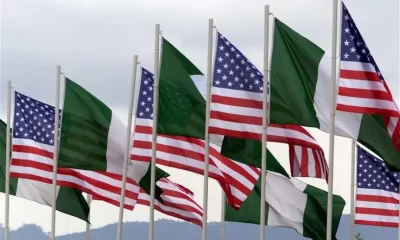National Issues
An Analysis Of Tinubu PAC’s Proposal To Merge Customs, NIMASA & FIRS -By Godson Ogheneochuko

A Policy Advisory Council Report has been in public circulation over the past week or more and its veracity as a work product of the National Economic Sub-Committee constituted by President Bola Tinubu (as President-elect, prior to taking the reins of power) has not been refuted by the President’s team.
In view of the potentially far-reaching consequences on trade facilitation and generally on the business environment in Nigeria, I have sought to analyse the proposal by the Policy Advisory Council (“PAC”) for a merger of 3 important agencies to form what could become a mega-agency to be known as the Nigerian Revenue Service. The affected agencies are the Federal Inland Revenue Service (“FIRS”), Nigerian Customs Service (“Customs”) and Nigerian Maritime and Safety Agency (“NIMASA”).
As with many government policies, there have been arguments for and against the PAC’s proposal. In the past week, views have been expressed by various stakeholders including the Africa Association of Professional Freight Forwarders and Logistics of Nigeria (“APFFLON”) and a former Director General of NIMASA, Dr Ade Dosunmu. According to APFFLON, NIMASA should be excluded from the proposed merger because “it will further impede ease of doing business in the maritime sector”. The Association further claimed that the move could have negative implications for the African Continental Free Trade Agreement and the single window policy of Customs. On his part, Dr Dosunmu, who is presently a Nigerian representative on the Council of International Maritime Organisation, queried the proposed policy on the grounds that it was wrong for the PAC to classify NIMASA as a revenue generating agency. He also warned that the proposed merger will be counterproductive with huge negative implications for Nigeria in the global shipping community.
Intention of the PAC proposal
While the PAC has advocated for implementation of the Stephen Oronsaye Report, the recommendations of which include reduction and streamlining of the Federal Government’s numerous Ministries, Departments and Agencies, the core focus of the proposal in question is on revenue generation and ultimately, securing the collected revenue from leakages. According to the PAC, the proposed Nigerian Revenue Service will, upon establishment, “collect all direct and indirect taxes and levies on behalf of the Federal Government.”
The main (immediate)consequences of implementing the PAC’s proposal would, therefore, be: (a) consolidation / merger of three major agencies into one; and (b)establishment of a single revenue collection unit i.e. the National Revenue Service.
The argument of NIMASA not statutorily being a revenue collection agency of the government has its merits but it is difficult to rely solely on that argument because NIMASA has continually collected revenue and remitted to the Federal Government- despite revenue collection not being a core mandate but simply a by-product of its activities.
Potential benefits of the PAC proposal (pros)
- Consolidation of the revenue collection processes is likely to make collection, tracking and audit easier. Sharing of knowledge, expertise and experience is also more likely to occur between officers of the different agencies. Cohesion of our revenue generation environment could also be engendered.
- Administration of our revenue system could also be simplified by having a single point of contact over revenue-related issues i.e head of the proposed Nigerian Revenue Service. Perhaps this will also help to avoid the situation that we saw several times during the President Buhari administration, where the Customs Comptroller-General was repeatedly given revenue generation mandates by the National Assembly. The former CG also appeared, on several occasions, to be at odds with the Finance Ministry, which is supposed to be the supervising ministry.
- The PAC proposal to keep one agency instead of the existing three is consistent with the spirit of the Oronsaye Report. The expectation is that if implemented diligently, the move should reduce the cost of governance.
- A potential benefit could also be that if the revenue units are properly streamlined, the focus of NIMASA and Customs would be channeled more effectively to trade / business facilitation. Too often, Customs’ attention during the initial 2quarters of each year is on meeting the Federal Government’s revenue targets, so much so that Customs Commands across the country unwittingly impede trade by seeking to raise additional revenue by every means possible. This often leads to levies’ and duties’ disputes that take months to resolve – and usually, after escalations to the headquarters. Unfortunately, as the revenue-generating actions cause additional hurdles to trade, the volume of revenue generated from trade activities also declines – making Customs even more desperate to bridge the revenue gap.
Some concerns regarding the PAC proposal (cons)
- Disruption – if the PAC proposal is not further assessed and ease / means of implementation is not carefully considered, there is a strong likelihood of trade disruptions occasioned by the agencies’ merger. Disruptions can be expected when (significant) changes are made butthe Nigerian governmentand business community (especially the manufacturers and exporters), cannot afford protracted or repeatedtrade disruptions at this time. Government must be transparent, communicative, and sure-footed about any changes in the business environment.
- Loss of morale –it is possible that merging the 3 agencies and causing their leaders to now report to an office lower than that of a Minister is likely to cause some loss of morale. In the case of Customs, for instance, while other paramilitary / similar agencies have their leadership reporting directly to a Minister, the CustomsCG is likely to be reporting to the Nigerian Revenue boss, who would in turn, report to the finance minister.
Recommendations
- There should be further analysis of the proposal, timely engagement with the critical stakeholders (such as manufacturers association, shipping agents, banking community, affected agencies, etc), as well as an impact assessment. This should help to avoid or mitigate unintended consequences of the proposal, including trade disruptions.
- Since the focus appears to primarily be on revenue collection, perhaps instead of (immediately) implementing a merger of the three agencies, the Federal Government should direct the affected agencies to further streamline their respective systems such that anysums that are still being made directly to bank accounts controlled by (or in the name of) the agencies’ should be paid directly to a designated federal government account.
Their internal payment or revenue-related systems / applications should also be consolidated such that there is only a single system applied across board and which enables the federal government to have a real-time view of the revenues that are due, collected or outstanding.
- If the federal government is keen to implement the PAC report in the short term, a viable option would also be to proceed with the proposed merger but maintain the 3 agencies as separate departments / units under the Nigerian Revenue Service.
The implication of this move would be that the objective of reducing the number of agencies would be met, revenue streams consolidation can be achieved, while also avoiding potential disruptions. The agencies would continue to operate business-as-usual, while the reorganisation / consolidation work is implemented behind the scenes and at the most appropriate time.
The above proposal is not without precedent. In neighbouring Ghana, the Customs Division sits under and reports to the Ghana Revenue Authority. The Ghana Customs Division is presently a department under the Revenue Authority. As distinct departments within a larger structure, Customs and NIMASA can continue to perform their trade facilitation and regulation duties with little or no (negative) impact on the business environment.
In summary, the PAC’s proposal is commendable and deserves further consideration. It is crucial, however, that the federal government begins to have the necessary conversations with key stakeholders, develop a comprehensive and inclusive plan of action and then, implement the plan with minimum fuss.
Godson Ogheneochuko is a public affairs specialist at Thekla Advisory and can be reached via godson.ogheneochuko@thadng.com










